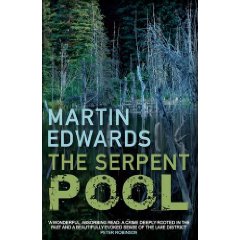Martin Edwards Guest Blog

Martin Edwards is one of my favourite contemporary crime-writers. His first series featured the lawyer, Harry Devlin, and were set in Liverpool. There’s a second series set in the Lake District and the fourth of those, THE SERPENT POOL, has just come out in paperback. I loved the previous one, THE ARSENIC LABYRINTH (great titles!). Martin has gone from strength to strength in recent years and I’m looking forward to reading the new one. I’ve been meaning to ask him to do a guest blog for a while. One of his strengths as a writer is his sense of place, and here he writes about what draws him to the Lake District:
Martin Edwards writes, ‘Books burn in the opening scene of my fourth and latest Lake District Mystery, The Serpent Pool, just issued in paperback in the UK. And the man who owns the books, an avid collector called George Saffell, watches bound and helpless as the flames race towards him.
It is a dark opening to a novel set in a beautiful part of the world. The Lake District’s landscape is fascinating at any time, and the main action of The Serpent Pool takes place at the start of a new year, in the cold days of early January, when fog descends from the fell slopes, and the forecasters warn of avalanches. Researching the real-life scenes of the fictional events of my book was enthralling (at least for me – my teenage children would prefer me to research a series set on the world’s sunniest beaches…)
Few areas anywhere that are as small as England’s Lake District (it is roughly thirty miles across) can boast such a rich literary tradition. William Wordsworth was the most famous of the Lake Poets, but Samuel Taylor Coleridge and Robert Southey still have admirers. Among novelists, Hugh Walpole (whose few crime novels are well worth a look, incidentally), Melvyn Bragg and nowadays Sarah Hall, have all used the landscape of the Lakes to great effect. As an essayist, Thomas De Quincey (who lived in Dove Cottage, former home of the Wordswoths) is beyond compare.
De Quincey’s dark shadow falls over The Serpent Pool. Apart from ‘Confessions of an English Opium-Eater’, a masterpiece of hallucinatory writing, he was most famous for ‘On Murder, Considered as one of the Fine Arts’, and this inspires Daniel Kind, to study his work while writing a book about the history of murder. In so doing, Daniel encounters a range of characters with something to hide, including the secret behind the violent death of George Saffell. I hadn’t read De Quincey before working on this novel, and I came to admire his writing, even if I remain deeply unconvinced about the benefits of opium to the creative process.
While Daniel focuses on De Quincey, Detective Chief Inspector Hannah Scarlett, who heads the Cold Case Review Team, investigates the unexplained death, six years ago, of a woman called Bethany Friend, who was drowned in an isolated patch of water known as the Serpent Pool. Hannah’s relationship with rare book dealer Marc Amos is on the skids, and as the winter weather worsens, the tension builds to a climax at the Serpent Pool. There Hannah comes to learn the truth. And when I wrote the final scene, I couldn’t help remembering that famous remark of Sherlock Holmes in ‘The Copper Beeches’:
‘It is my belief, Watson, founded upon my experience, that the lowest and vilest alleys in London do not present a more dreadful record of sin than does the smiling and beautiful countryside.’
I can only hope the Lake District tourist authorities forgive me for introducing murder and mayhem into this most gorgeous of locations!’
2 Comments
AnnOxford
February 18, 2011Martin, Arsenic Labyrinth is brilliant! (I believe it was a recommendation from Christine right here on her blog.) As my forbears were Cornish miners, I was doubly interested to learn of the dangers of their occupation. Great story, too. Now I shall have to read The Serpent Pool as soon as it comes to the U.S.
AnnOxford
Martin Edwards
March 25, 2011Thank you very much, Ann!